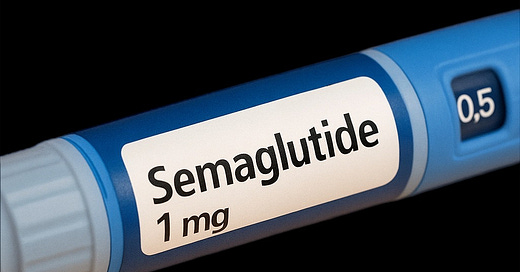We don’t usually get big updates on type 1 diabetes at these obesity conferences, but ADA 85 quietly gave us something surprising.
A new trial called ADJUST-T1D just dropped data on semaglutide use in people with type 1 diabetes and obesity, and the results are kind of a big deal.
This was a 26-week, double-blind study. Researchers gave 72 adults with type 1 diabetes and a BMI of 30 or higher either semaglutide up to 1 mg weekly or a placebo. Everyone in the study was already using automated insulin delivery, so the real question was whether semaglutide could add anything meaningful on top of that.
Turns out it can.
The primary outcome was a composite, and a tough one. Participants had to hit three goals:
More than 70 percent time in range between 70 and 180 mg per deciliter
Less than 4 percent of time below range
And at least five percent weight loss
Thirty-six percent of patients on semaglutide nailed it. Zero percent on placebo did. That’s not a typo. Zero.
Here’s what else they found:
Average A1C improvement was 0.3 percent
Time in range increased by nearly nine percentage points
Average weight loss was 8.8 kilograms, or just over 19 pounds
There was no increase in diabetic ketoacidosis, and both groups had two cases of severe hypoglycemia. In other words, semaglutide helped without adding new safety concerns.
Semaglutide isn’t approved for type 1 diabetes. But this study shows it may play a role in helping people with type 1 and obesity reach blood sugar and weight goals that have often been out of reach.
For years, type 1 diabetes has been left out of the GLP-1 conversation. ADA 85 just cracked the door open.
If you live with type 1 and you’ve struggled to manage your weight while balancing insulin and blood sugar, this trial is worth paying attention to. It’s not a revolution. But it is a start.
And with Breakthrough T1D backing this research, more could be coming.
This will be my final ADA 85 update for now. We’ll still be covering bits and pieces from the conference in future posts, but this is the last rapid-fire drop from the weekend. If you’ve appreciated the coverage, I’d love to hear from you—use the comment button near the top and let me know what stood out or helped you most.






My 19 year old daughter has type 1 and has been on Zepbound for about a year, prescribed by her endocrinologist. She’s lost about 45lbs and decreased her insulin usage by about 1/3rd, which is significant. Type 1’s can be significantly insulin resistant, like anyone can be, and high levels of insulin drive hunger, even injected insulin, which causes weight gain. It has helped her so significantly!
Great information. Thanks for sharing. I’m on the fitness end of things and trying to keep things simple for people on GLP weight loss. This is a great step with the study, but there’s so many other benefits to exercise. I wanna make sure we get people moving. I invite you to check out my sub stack and see the post that I did today. Keep up the great work